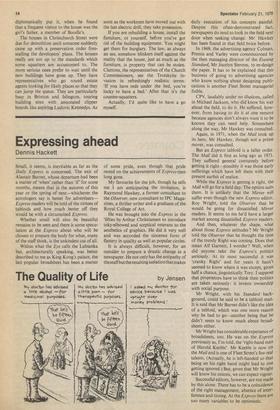Expressing ahead
Dennis Hackett
Small, it seems, is inevitable as far as the Daily Express is concerned. The exit of Alastair Burnet, whose departure had been a matter of 'when' rather than 'if' for some months, means that in the autumn of this year or the spring of next—whichever the astrologers say is better for advertisers— Express readers will be told of the virtues of tabloids and how much better off they would be with a circumcised Express.
Whether small will also be beautiful remains to be seen and there is some speculation at the Express about who will be chosen to prepare the body for what, many of the staff think, is the unkindest cut of all.
Within what the Eye calls the Lubianka but, architecturally speaking, was better described to me as King Kong's palace, the last popular broadsheet has been a matter of some pride, even though that pride rested on the achievements of Express-men long gone.
My favourite for the job, though he tells me I am anticipating the invitation, is Raymond Hawkey, a former consultant to the Observer, now consultant to IPC Magazines, a thriller writer and a graduate of the Royal College of Art.
He was brought into the Express in the 'fifties by Arthur Christiansen to introduce inky-elbowed and sceptical veterans to the aesthetics of graphics. He did it very well and was accorded the sincerest form of flattery in quality as well as popular circles.
It is always difficult, however, for an outsider to prepare a drastic change in a newspaper. He not only has the antipathy of thestaff but theresulting isolation that makes daily execution of his concepts painful. Despite this often-demonstrated fact, newspapers do tend to look in the field next door when seeking change. Mr Hawkey has been found in that field twice before.
In 1969, the advertising agency Colman, Prentis and Varley were commissioned by the then managing director of the Evening Standard, Mr Jocelyn Stevens, to re-design the paper. It has to be explained that this business of going to advertising agencies who know nothing about designing publications is another Fleet Street managerial foible.
CPV, laudably under no illusions, called in Michael Jackson, who did know his way about the field, to do it. He suffered, however, from having to do it at one remove because agencies don't always want it to be known they can need help. Somewhere along the way, Mr Hawkey was consulted.
Again, in 1971, when the Mail took up its hem, Mr Hawkey, though not a prime mover, was consulted.
But an Express tabloid is a taller order. The Mail did it first as long ago as 1971. They suffered general contumely before getting it right—possibly it was those early sufferings which have left them with their present surfeit of malice.
While the Express is getting it right, the Mail will go for a field day. The option suits them. It is unlikely that the Mirror will suffer even though the new Express editor, Roy Wright, told the Observer that he would be going for dissatisfied Mirror readers. It seems to me he'd have a larger market among dissatisfied Express readers.
And then, whatever the shape, what about those Express attitudes ? Mr Wright told the Observer that he thought the time of the trendy Right was coming. Does that mean Alf Garnett, I wonder? Well, when did anyone take the Express's politics seriously. At its most successful it was 'cranky Right' and for years it hasn't seemed to know where it was except, given half a chance, jingoistically Tory. I suppose that proprietors have to think their politics are taken seriously: it invests ownership with social purpose.
Mr Wright, with his Standard background, could be said to be a tabloid man. It is said that Mr Burnet didn't like the idea of a tabloid, which was one more reason why he had to go—another being that he didn't seem to know much about broadsheets either.
Mr Wright has considerable experience of broadsheets, too. He was on the Express previously as, I'm told, the 'right-hand man of Harold Keeble'. Mr Keeble is now on the Mail and is one of Fleet Street's few real talents. (Actually, he is left-handed so that being on his right hand might lead to one getting ignored.) But, given that Mr Wright will know his onions, we can expect vigour.
Successful editors, however, are not made by this alone. There has to be a coincidence of the right management, absence of interference and timing. At the Express there are too many variables to be optimistic.


































 Previous page
Previous page